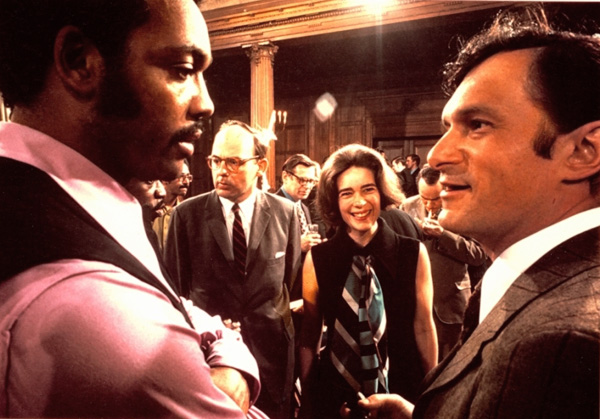|
Reviews of Recent Independent, Foreign, & Documentary Films in Theaters and DVD/Home Video

HUGH HEFNER: REBEL,
ACTIVIST AND REBEL Canadian-based filmmaker Brigitte Berman’s documentary should more appropriately be titled “In Defense of Hugh Hefner” for emphasizing the Playboy magazine founder’s long-standing support of Civil Rights and various other progressive causes over the more titillating (I couldn’t resist) aspects of his career. In what’s bound to be a disappointment to many, comedian Dick Gregory and Rev. Jesse Jackson have almost more face time in the movie than any former bunny or playmate. Does Berman reveal anything new about the not-so-private mogul during the long 124 minutes? Yes, unless you were around to see the syndicated TV cocktail party Playboy’s Penthouse, which only ran from 1959 to 1960. Its camaraderie and banner is as canned as ham, but it’s fascinating to watch the clips of an integrated mix of jazz greats, Tony Bennett, and Peter Singer leading a sing-along to “Goodnight, Irene,” all hanging out with the beautiful young women surrounding Hefner. A decade later, Hefner produced the series Playboy After Dark, in which guest star Joan Baez eloquently espouses an anti-war message seated among centerfold-material women. Among the other musical clips that elongate the running time are Country Joe and the Fish and singer Bobby Doyle. From the get go, Berman throws in the towel, not attempting to bridge Hefner’s humanitarianism and his role as the purveyor of masturbatory fantasies. For this reason she includes in the film’s opening former 1994 Playmate of the Year Jenny McCarthy’s recognition that the public probably has difficulty reconciling his disparate achievements. Berman briefly rehashes the woman-as-sex-commodity/object debate, but given that she has Hefner’s full participation, inevitably he has the last word. In response to the criticism that he dehumanizes women by turning them into “bunnies,” he responds, “Of course, we’re animals. [The models] are a great deal more than that, but they are sex objects.” Duh. Playboy may have been one of many forces that loosened society’s bra strap, but today Hefner’s barely R-rated pictorials seem quaint in comparison to what’s out there from other publishers, like Hustler, or on the Web, the home to millions of photos of other girls-next-door engaging in activity that would never see the light of day in Playboy. Gloria Steinem, who went undercover as a bunny in a Playboy club for magazine exposés, declined to be interviewed for the movie, but I’m not convinced that pop/gospel singer Pat Boone is a convincing spokesman to denounce Hefner as a pornographer. It’s kind of an uphill battle to take on a recipient of a NAACP Image Award. (According to Hefner, the last piece Martin Luther King, Jr. wrote was published by Playboy shortly after his assassination.) Berman dryly focuses on the man’s career and activism, not so much his private life. Though Hefner openly discusses the impact of the murder of 1980 Playmate of the Year Dorothy Stratten, he barely offers a word about his two marriages or anything on the death of Anna Nicole Smith. No Barbie Benton either, nor snipping from former playmates or embittered bunnies. However, no
one can accuse Hefner of hypocrisy. Now 84, he seems to have grown
comfortably into old age without facelifts, Botox, or hair dye. Of
course, it helps that he has a full head of hair, but who nowadays would
admit to being the best jitterbugger in his high school class? As anyone
who watches E! would know, in recent years he has been involved with Sandy, Mandy,
Brandi (at the same time), and many more. Given his stamina alone, his
face should be on every bottle of Viagra. But it’s left to the women
(naturally) to belatedly reveal the more intimate. Former playmate and
girlfriend Shannon Tweed sums up the end of her relationship with Hefner
by her admission that she doesn’t share well, and Dr. Ruth Westheimer
makes the film’s most provocative statement—Hefner’s not taken seriously
because he has mixed his work with his life. That’s especially true when
it’s televised relentlessly on cable TV.
Kent Turner
|

